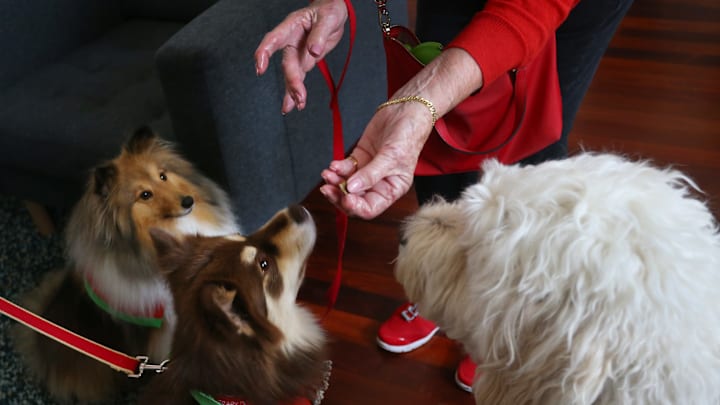Dogs love food. A chunk of meat is all you need to get them to sit down or fetch a ball, but some breeds are unique as they're less driven by it. A recent study explores how food significantly impacts dogs’ motivation to do tasks or solve a problem. Learn more about how it influences the brain activities of your pup.
What Motivates Dogs?
Three main factors can spur dogs to act, but treats rank at the top of this list.
1. Treats
Food works best when you want to fire your dogs’ motivation. While it may seem easy to lure them with their favorite treats — like lobster, cantaloupe or bananas — and command them to sit or stay put, it can backfire if you don’t know how to train. Your furry friend may see food as a bribe instead of a treat. It may only obey your command if food is part of the deal.
2. Toys
Like humans, dogs also have different personalities and preferences. Some may enjoy biting, chewing or playing with a toy — instead of snacks — to keep them engaged and stimulated.
3. Attention
Sometimes, simply rubbing their belly or petting their heads provides sufficient motivation for them to do your commands.
What Are the Most Food-Motivated Dogs?
Does your dog stare at you? While such behavior can mean they love you, it's a different story when they look at you expecting another helping right after dinner. Some dogs hunt for snacks all the time. Here are the 10 breeds that are most motivated by food.
- Pugs
- Rottweiler
- Labrador Retrievers
- Great Pyrenees
- Norwegian Elkhound
- Golden Retrievers
- Dachshund
- Beagles
- English Bull Terrier
- Pembroke Welsh Corgi
While it can be alarming if your dog shows signs of a voracious appetite, some factors influence their food obsession, such as environmental changes, medications, health disorders and age. It’s important to always monitor your dog's body size, as being overweight can impact their metabolism, joints and ability to breathe. Feed them a good diet and limit giving treats to what's healthy.
Genes also contribute to some of the breeds’ food dependency. A mutation called pro-opiomelanocortin (POMC) can increase labrador retrievers' appetite, making food their primary motivator.
How Does Food Motivate Dogs?
A recent study found that dogs' preference for particular foods impacts their brain activity and behaviors.
Researchers did two experiments on 20 trained family dogs. The first experiment focused on how dogs behave when presented with two different treats — cooked ham as a highly rewarding treat and unsweetened fiber cookies as a less rewarding treat. These foods were associated with particular sounds — a high-pitched tone for cooked ham and a low-pitched tone for fiber cookies. Researchers wanted to determine whether the dogs could solve the problem faster after hearing a sound corresponding to a more gratifying treat. The dogs unwrapped the box with cooked ham faster after hearing a high-pitched sound, representing a highly rewarding treat than the box containing fiber cookies.
In the second experiment, another 20 family dogs were trained to stay still inside an MRI scanner. At first, they were exposed to high- and low-pitched sounds without meaning. Then, they did the first experiment, unwrapping the box and learning what was associated with the tones.
They did another scanning session after unwrapping and found that this time, there was a higher response in the caudate nucleus — a part of the brain associated with the reward system — after hearing a high-pitched tone associated with higher reward than a low-pitched tone.
Researchers determined this brain area allows dogs to choose between rewards based on quality. In summary, some dogs' motivation depends on high-rewarding stimuli. They're less enthusiastic if they determine a treat to be low rewarding.
What Dog Breeds Are Not Food-Motivated?
The dogs' motivation with food makes training easy, but it can be challenging for breeds that find treats less appealing, like herders, terriers and guardian breeds.
You'll need high-value treats like meat or sausage to get these furry friends to do what you want. If they don't respond, try other foods or check if they’re sick. Sometimes, they lose their appetite because they’re sick.
What Can I Do To Motivate My Dog?
If you want to train your dog to do specific tasks, these are valuable tips to increase their motivation.
1. Use a Variety of Rewards
Dogs have different personalities so what motivates them also varies. Switch up the rewards between toys, treats and attention so they remain interested and motivated.
2. Reinforce Training With Preferred Rewards
If they love toys over food, carry one with you to hand in after teaching them a new skill. Pick a suitable reward for your dog, as it helps reinforce the link between the action and the treat.
3. Use Environmental Rewards
If your dog loves a specific activity — like playing with water, going for a walk or getting up on a couch — you can use these as another reward to keep them engaged.
Dogs’ Motivation Are Affected by a Stimulus
Depending on your training input, dogs may respond uniquely to reward stimuli. For instance, they become more motivated to fetch a ball after receiving a toy. Dogs' brains have nearly the same programming as humans, which enables them to distinguish and choose better rewards and act in ways that achieve them.
